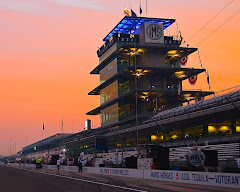 We tried to warn citizens about the emerging strategy. Now, regrettably, seedlings of APEX Brasil Deep Capture are beginning to appear. The behemoth is unintentionally undermining all hope of remaking IndyCar into something that the market will accept.
We tried to warn citizens about the emerging strategy. Now, regrettably, seedlings of APEX Brasil Deep Capture are beginning to appear. The behemoth is unintentionally undermining all hope of remaking IndyCar into something that the market will accept.The first step toward Deep Capture is enabled by the Brazilian Trade and Promotion Agency's Business Support Center in Miami.
Sell it if you got It
IndyCar has demonstrated that it is not interested in remaking its product to please consumers. However, IndyCar is interested in distributing free tickets to the Miami race to those who sample Brazilian foods at Sedano's supermarkets in South Florida.
Attendance at the Homestead-Miami event is typically mediocre and occasionally lousy. We suggest that IndyCar fans get used to it.
APEX Brasil obviously purchased the Homestead-Miami tickets from the International Speedway Corporation. The project value lies in the sampling of food. Will the recipients of the freebies even use the tickets?
That's supposed to be the really cool thing. It doesn't matter. ISC wins, APEX Brasil wins, and the IndyCar Series collects its sanction fee and leaves behind the stench of another subpar event. Guys like Terry Angstadt revel in pulling off deals like this. They are fools.
Then, when television ratings are released, exposing the ugly and undeniable truth, IndyCar teams, secure in their self-aggrandizement, will blame Versus. Angstadt is left to defend his television partner. Perhaps those attempts to circumvent market demand weren't so smart, after all.
Recall that this is Terry Angstadt's plan for "raising the value of the IndyCar Series."
Here's a rule of thumb: if it is free, then it is worth nothing.
I will concede that shenanigans such as these are a good idea only on the day when Roger Penske determines that the best way to make money in the truck rental business is to sell barbecue sauce. Until then, I shall consider it a fool's errand.
Is it any wonder that Homestead-Miami was included in the 2010 IndyCar schedule? It will be profitable, fans or no fans. The emerging strategy is unfolding before our eyes.
How is it that this silly little plan apparently seems like a good idea to the members of the IMS Board? Would they rather the grandchildren become custodians of the Greatest Race in the World or sales reps for exotic foods?
An Important Distinction
Before we continue, I want to make something perfectly clear. Brazil has every right to aggressively market its products and services in the United States of America. The South American nation is poised for substantial growth in the global economy. This is largely the result of hard work.
Brazil has earned the opportunities that are before it because, unlike the IRL, it has addressed its fundamental economic challenges, in particular a historically skewed distribution of purchasing power that favored a tiny, well-connected class of industrialists and bureaucrats at the expense of everyone else.
Sound familiar?
If you think that correcting this problem was easy, then we suggest that you attempt to accomplish something similar in the United States. It's no picnic. The difficulties that Brazil has overcome were much greater.

And, so, congratulations to the people and leadership of Brazil. The Indy Idea welcomes your fine products and services (and impossibly gorgeous models) to the United States.
However, we do request that you not recapitalize and therefore perpetuate an IndyCar racing product that the market has rejected. The United States is already home to dozens of Zombie Banks. It does not need a Zombie Racing Series to increase yankee misery.
Tough Love
Bankruptcy - comprehensive market failure - can be a very good thing. It breaks down silos, strips bare vested interests, and allows for cancelation of contracts that are not beneficial to the insolvent firm. The IRL is not likely to go bankrupt in the legalistic sense because it is owned and subsidized by the Indianapolis Motor Speeedway Corp.
Frankly, that's too bad. If not for its corporate parent, the IRL would be in Chapter 11 as we speak. It would have to cut costs to match its market value. It would be subject to market discipline. And it would be much better off than the operationally bankrupt Zombie Racing Series that it is today. Without subsidies, this wounded animal would come to know mercy.
APEX Brasil has good and noble intentions. But its benevolence is cruel.There is no doubt that the IRL needs APEX Brasil much more than APEX Brasil needs the IRL. We reach this conclusion because we assume that APEX Brasil has products that people actually want to buy.
Furthermore, what does IndyCar have to do with APEX Brasil's mission? Are race tickets necessary to convince grocery shoppers to sample free food? The logic seems confused.
The real value to be derived from the IRL/APEX Brasil partnership will ultimately be domiciled not in the racing, but rather in the derivative distribution contracts. And so I ask again: have we learned nothing?
We would wager that Brazilian products and services are of sufficient quality to be effectively marketed in the United States without having to endure the shackles of a Zombie Racing Series that refuses to fix its product.
So it seems that tomorrow shall be Groundhog Day in the IndyCar Series once again.
Will somebody at the Indy Racing League and the World's Greatest Race Course please stop this madness and give consumers what they want?
Roggespierre


Apex Barsil, may be using the IRL to test market it's methods---so I have sent your website to them. They are not fools and I am trying to find out who advises them--they'll get your website as well!
ReplyDeletePerhaps they could see the problem and become part of the solution.
What would happen if they agreed to back the series, but insist on a "workable business plan", based on the real numbers?
The sisters at IMS (along with Mommy) are not inclined to keep pouring money into the IRL, and that means that SOONER NOT LATER the IRL has to become at least cash flow neutral.
osca
Good Morning Osca,
ReplyDeleteYou're probably right about APEX Brasil. This seems like a serious organization to me. It could become a legitimate market force in the USA in very little time.
That's the thing. Does it really need the IRL? For example, if you go to Costco on any given weekend, then you will be inundated with samples of free food. It's pretty cool. But I'm guessing that those vendors did not have to purchase race tickets to get their feet in the door.
We can predict with some certainty that APEX Brasil will outgrow the IRL in short order. If the league doesn't have its stuff together soon, then where does that leave it? Unfortunately, APEX Brasil's participation at present seems to give the IRL incentive to not get its house in order.
Maybe you're right. APEX Brasil likely has some pretty stout management talent at its disposal. I went to school with a lot of Brazilian students - very, very impressive. I'm no sociologist, but it seemed to me that their culture made them a good fit for American business leadership, more so than students from some other nations.
Regarding your last point, that's the problem. These sales promotions are central to Angstadt's plan to make the IRL cash flow-neutral. It might work. If it does, then will the IMS directors recognize that the revenue is in lieu of demand for the product? Or will they not figure that out until 2012, 2013, or whatever year it is that the attendance at the Indianapolis 500 looks like that of the 2000 US Grand Prix?
There are unintended consequences - or as you economists like to say, externalities - that might not be apparent until it is too late.
And that would really stink.
Best Regards,
Roggespierre